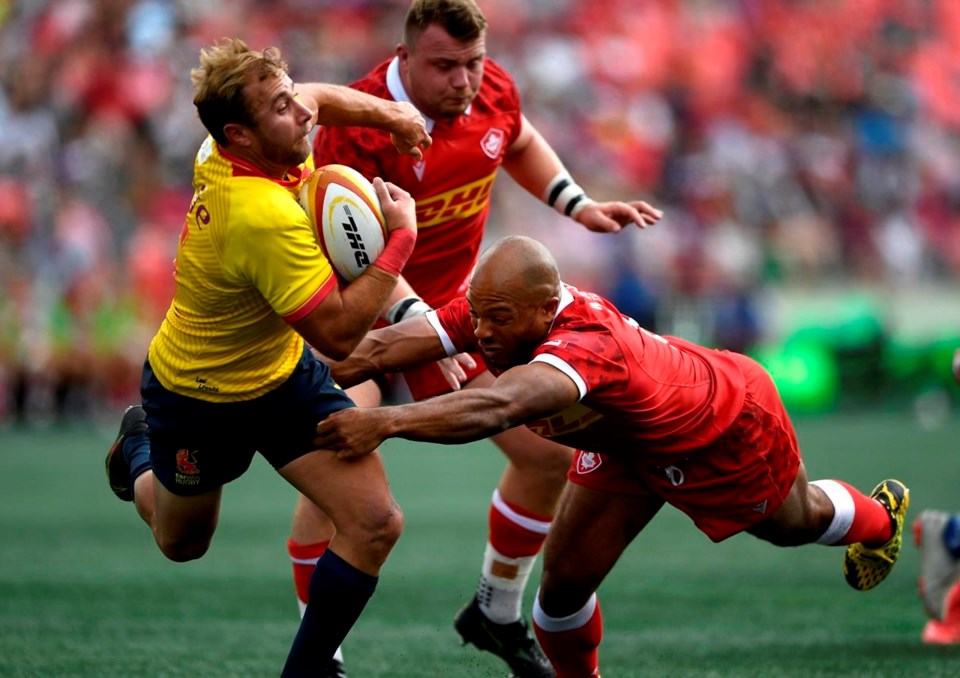Rugby Canada has unveiled its strategic plan for 2024 to 2027, a wish list with some bold ambitions.
Among them is having Canada "recognized and respected worldwide as a top-12 rugby nation on and off the field."
The Canadian men, who failed to qualify for this year's Rugby World Cup, rose two spots to No. 21 in the world rankings last month. Their best-ever ranking was No. 11, for one week in September 2011.
"We're not going to reach the top 12 in the next three years. We know that," Rugby Canada CEO Nathan Bombrys said in an interview. "But it's a statement of ambition, a statement of intent."
World Rugby has announced plans for a new biennial Nations Championship starting in 2026, featuring the top 12 sides in the world with a second division showcasing the next 12 teams.
The top 12 division "is where we want to be," said Bombrys, adding the immediate priority is to qualify for the 2027 World Cup.
The strategic plan also calls for the Canadian women, currently ranked fourth, to remain in the top four and be "in contention to win Rugby World Cup 2025."
The blueprint is titled One Team, which carries several meanings.
It marks Rugby Canada's continuing commitment to allow players to move between the sevens and 15s programs, a departure from past years when the governing body moved to separate the two teams.
The plan goes further, with a goal to "re-purpose sevens to develop players for 15s and compete in the Olympics" as well as choosing "the best players to play in the best competitions at the right time."
The One Team title also refers to standardizing player pathways across the provinces.
"We can only achieve our potential if we're aligned and working together," Bombrys said. "And that's where 'One Squad' really comes in because we have massive potential and if we can come together and work in collaboration, then we're going to make some significant strides forward."
The plan calls for the establishment of up to four high-performance training centres or hubs by the end of 2025 with another four by 2029.
"We're going to need partnerships to make these happen," Bombrys said.,
They may be modest facilities to start with, he added. Rugby Canada's finances are limited, with income of about $16 million this year.
"We have to grow that. It's not enough. I ran a middle-sized European club that had one team that operated on a very similar-sized budget," said Bombrys, who was managing director with Scotland's Glasgow Warriors before taking up his Rugby Canada role.
"Here we have four teams (men's and women's 15s and sevens) plus an entire country of rugby and we need to generate more revenue It's as simple as that."
It needs sponsors to step up and help out.
Rugby Canada currently just has a training centre in Langford on Vancouver Island. Bombrys said feedback from players was they didn't want to have to move across country.
But he said for the time being, players may have to move outside of Canada to pursue a pro career.
Another goal is to host up to four major events each year, likely newsworthy 15s internationals matches, in addition to the annual Canada Sevens, to "generate a net positive financial contribution to Rugby Canada."
With the Toronto Arrows — the lone Canadian entry in Major League Rugby — closing shop, the strategic plan calls for ways to help find Canadian talent a home to play. Bombrys says Rugby Canada has begun talks "with every major competition in the world" about strategic partnerships.
That includes MLR.
"And we'll see where it takes us," said Bombrys. "But we're clear. Ae want the best players playing the best rugby in preparation for playing for Canada."
Rugby Canada chair Sally Dennis called the strategic plan "bold" and "clear."
"It contains ambitious but achievable goals," she wrote in the report. "It clarifies the role and commitments of Rugby Canada and specifies clear outcomes, drivers and strategies to achieve those outcomes. We have acknowledged that Rugby Canada cannot successfully be all things to all people, so some tough decisions have been made."
Asked what those tough decisions were, Bombrys pointed to grassroots rugby.
"From a Rugby Canada perspective our focus is going to be on high performance and being a leading sports organization and raising money. Those are the three focuses.
"What we're saying is we need the grassroots and we want the grassroots to survive," he added. "It's now about aligning who actually does the grassroots."
Bombrys says an improved game calendar will also help, from the test level all the way down. Having a set national team schedule will pave the way for age-grade fixtures, then domestic competition.
"Over a period of, say, a few years we can start to have a real cohesive calendar across the country," he said.
---
Follow @NeilMDavidson on X platform, formerly known as Twitter
This report by The Canadian Press was first published Dec. 6, 2023
Neil Davidson, The Canadian Press



